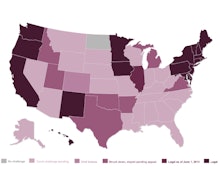There Is Now Only One State in the Country That Hasn't Challenged Same-Sex Marriage Laws

The news: And then there was one.
On Thursday, six couples filed a federal lawsuit in South Dakota to challenge the state's 2006 constitutional amendment to ban same-sex marriage. South Dakota is now the 30th state to have a pending marriage equality lawsuit, which means that only one state — North Dakota — still has an unchallenged gay marriage ban on the books.
"It's exciting, and for me it's a proud moment to be a part of changing history. And I feel the weight of that — that this is going to affect so many people beyond us," said Nancy Rosenbrahn, one of the South Dakota plaintiffs.
The unstoppable march: The South Dakota lawsuit comes on the heels of more good news for marriage equality advocates; this week, Oregon and Pennsylvania became the 18th and 19th states where same-sex couples can get married (in addition to Washington, D.C.). Federal judges stuck down marriage bans in those states, which officials declined to appeal.
In Illinois, marriage equality will not be enacted statewide until June 1; but couples in Chicago and the surrounding Cook County have been getting married since this February.
Image Credit: The Wire
In recent months, federal or state judges in Idaho, Oklahoma, Virginia, Michigan, Texas, Utah and Arkansas found same-sex marriage bans in those states to be unconstitutional. Judges also have ordered Kentucky, Ohio, Tennessee and Indiana to recognize same-sex marriages that were performed in other states; these 11 rulings are all set to be challenged.
One state to go: Attorney Josh Newville, who filed the South Dakota suit, is considering a similar challenge in North Dakota, which overwhelmingly passed a constitutional amendment to ban same-sex marriage back in 2004.
But it might be a tough road ahead. After all, nearly 75% of North Dakota voters were in favor of the constitutional ban on same-sex marriage. And according to a 2012 Gallup poll, North Dakota has the fewest LGBT residents proportional to its total population: only 1.7 % of residents identified as such. In comparison, the second-lowest percentage was 2.6% in Mississippi, Montana and Tennessee.
"We are very comfortable and confident that the constitutional amendment we have should stand and if for some reason it wouldn't, I'm very comfortable that our attorney general would appeal that," said Tom Freier, the executive director of the North Dakota Family Alliance, which campaigned in favor of 2004 ballot measure.
Still, it can't be denied that marriage equality is slowly but surely taking over the country — and North Dakota may not be able to hold out for much longer.